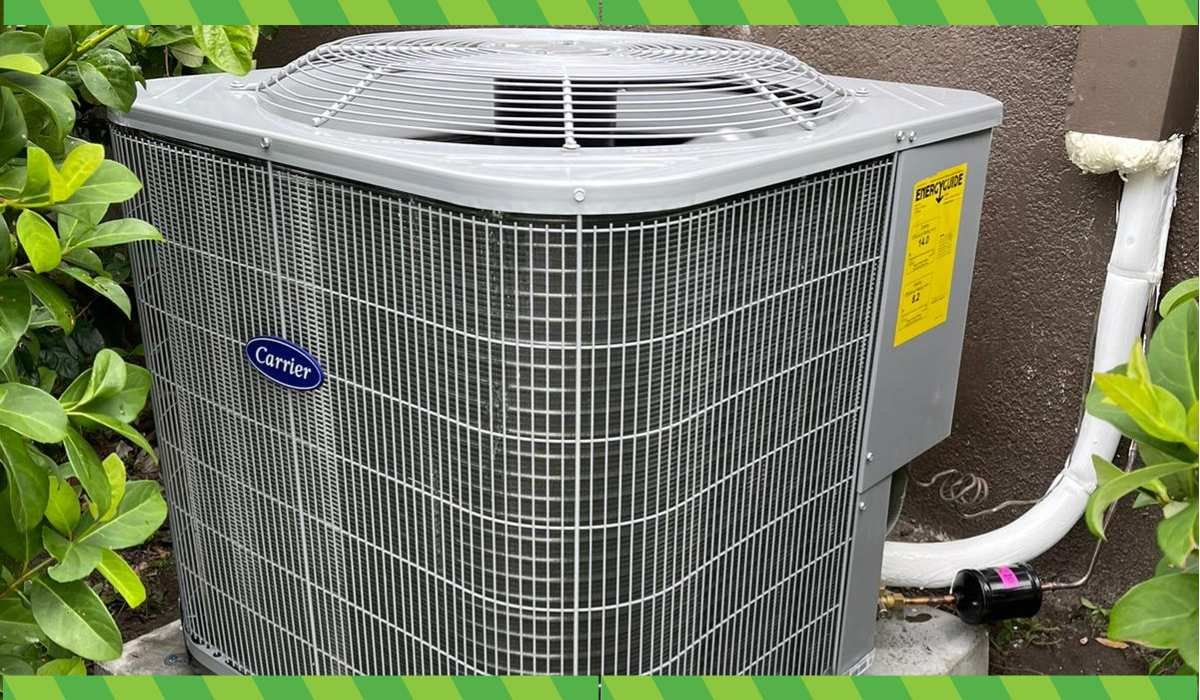Is it worth fixing an AC?
Air conditioning is an essential part of modern life, especially in areas with hot and humid climates like Tampa. It helps to keep indoor spaces comfortable and safe, particularly during the summer months. However, like any other mechanical system, air conditioners can break down or become less efficient over time. When faced with a malfunctioning or outdated AC, homeowners are often left with a difficult decision: repair or replace?
Deciding whether to repair or replace your air conditioning system can be a challenging task. There are several factors to consider, including the age of the AC, the cost of repair, energy efficiency, type of AC, and environmental considerations. Each factor plays a significant role in determining whether it is worth fixing your AC or if it is more practical to replace it.
In this blog, we will explore the pros and cons of repairing or replacing your air conditioning system. We will discuss the factors you should consider when making this decision and provide you with the information you need to make an informed choice. Whether you are facing a malfunctioning AC or looking to upgrade to a more energy-efficient system, this blog will help you determine the best course of action for your situation.
So, is it worth fixing an AC? Let’s find out.
Age of the AC:
The age of your AC unit is an important factor to consider when deciding whether to repair or replace it. As a general rule of thumb, air conditioning units last between 10 and 15 years. However, the lifespan of your AC can vary depending on factors such as the brand, model, and usage.
If your AC unit is more than 10 years old and requires frequent repairs, it may be time to consider replacing it. As AC units age, they become less efficient, and parts may be harder to find and more expensive to replace. Furthermore, newer models are typically more energy-efficient and come with advanced features that can save you money in the long run.
On the other hand, if your AC unit is less than five years old and requires minor repairs, it may be worth repairing rather than replacing. AC units that are well-maintained and serviced regularly can last longer than 10 years and provide reliable performance.
If you are unsure whether to repair or replace your AC unit, consult with an HVAC professional. They can inspect your unit, assess its condition, and provide you with expert advice on the best course of action based on your specific needs and budget.
In summary, the age of your AC unit is a crucial factor to consider when deciding whether to repair or replace it. If your unit is more than 10 years old and requires frequent repairs, it may be more practical to replace it. However, if your unit is less than five years old and requires minor repairs, it may be worth repairing. Consulting with an HVAC professional can help you make an informed decision and ensure that your AC unit provides reliable performance for years to come.
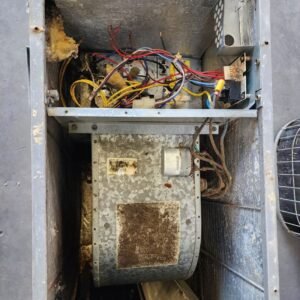
Age of the AC, Old Air Conditioner
Cost of Repair:
The cost of repairing your AC is another crucial factor to consider when deciding whether to repair or replace it. In general, minor repairs such as replacing a capacitor or fan motor can cost a few hundred dollars, while major repairs such as replacing the compressor or condenser can cost several thousand dollars.
As a general rule of thumb, if the cost of repairing your AC is less than 50% of the cost of a new AC unit, repairing it may be the more cost-effective option. However, if the cost of repair is more than 50% of the cost of a new unit, it may be more practical to replace it.
It is important to note that the cost of repair can vary depending on factors such as the age of the AC unit, the type of AC unit, and the complexity of the repair. For example, if your AC unit uses R-22 refrigerant, which is being phased out, the cost of repairing it may be higher due to the increasing scarcity of R-22 refrigerant.
When considering the cost of repair, it is essential to factor in the long-term costs associated with operating an older, less energy-efficient AC unit. Newer AC units are typically more energy-efficient and come with advanced features that can save you money on your energy bills over time.
Ultimately, the cost of repair is a critical factor to consider when deciding whether to repair or replace your AC unit. If the cost of repair is minor and the AC unit is relatively new, repairing it may be a viable option. However, if the cost of repair is substantial, and the AC unit is old and inefficient, replacing it may be the more cost-effective option.
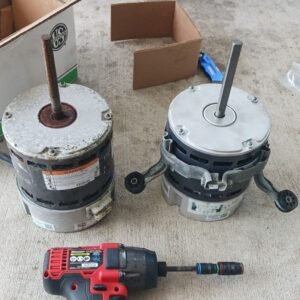
Cost of Repair, blower motor replacement
Energy Efficiency:
Energy efficiency is an essential factor to consider when deciding whether to repair or replace your AC unit. AC units are one of the largest consumers of energy in homes and businesses, and inefficient units can result in high energy bills.
Newer AC units are typically more energy-efficient than older models, as they are designed to meet higher energy efficiency standards. One way to determine the energy efficiency of an AC unit is by checking its SEER rating.
SEER, or Seasonal Energy Efficiency Ratio, is a measure of an AC unit’s cooling output divided by its energy consumption over an entire cooling season. The higher the SEER rating, the more energy-efficient the AC unit is. Older AC units may have a SEER rating of 6 or 7, while newer models typically have a SEER rating of 13 or higher.
Replacing an old, inefficient AC unit with a new, energy-efficient model can result in significant energy savings. According to the U.S. Department of Energy, upgrading to a high-efficiency AC unit can result in energy savings of 20% to 50%.
Additionally, many newer AC units come with advanced features such as programmable thermostats, which allow you to set specific temperature schedules to reduce energy consumption when the AC unit is not needed. Other features, such as variable-speed fans and two-stage compressors, can also help improve energy efficiency and reduce energy costs.
In summary, energy efficiency is an essential factor to consider when deciding whether to repair or replace your AC unit. Newer AC units are typically more energy-efficient than older models, and upgrading to a high-efficiency AC unit can result in significant energy savings. Furthermore, advanced features such as programmable thermostats and variable-speed fans can help further improve energy efficiency and reduce energy costs.
Type of AC:
The type of AC unit you have is another important factor to consider when deciding whether to repair or replace it. There are several different types of AC units, including central air conditioning systems, ductless mini-split systems, and window air conditioners.
Central air conditioning systems are the most common type of AC unit in homes and businesses. They use a network of ducts to distribute cool air throughout the building. Central air conditioning systems are typically more expensive than other types of AC units, but they are also more efficient and can cool large areas.
Ductless mini-split systems are an alternative to central air conditioning systems. They consist of an outdoor unit that is connected to one or more indoor units via refrigerant lines. Ductless mini-split systems are ideal for cooling individual rooms or areas, and they can be more energy-efficient than central air conditioning systems.
Window air conditioners are a popular option for small spaces or individual rooms. They are typically less expensive than central air conditioning systems or ductless mini-split systems, but they may not be as efficient and may not cool large areas as effectively.
When deciding whether to repair or replace your AC unit, it is important to consider the type of AC unit you have. If you have a central air conditioning system that is relatively new and still under warranty, repairing it may be the most cost-effective option. However, if your central air conditioning system is old and inefficient, replacing it with a newer, more energy-efficient model may be a better option.
Ductless mini-split systems and window air conditioners are generally less expensive to replace than central air conditioning systems. If your ductless mini-split system or window air conditioner is old and inefficient, it may be more cost-effective to replace it rather than repairing it.
In summary, the type of AC unit you have is an important factor to consider when deciding whether to repair or replace it. Central air conditioning systems, ductless mini-split systems, and window air conditioners each have their pros and cons, and the decision to repair or replace will depend on the age, efficiency, and cost of the specific unit.
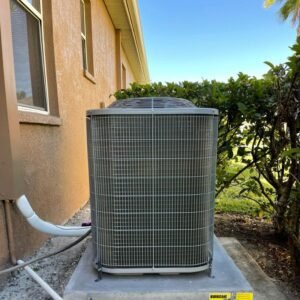
Type of AC, condenser central ac
Environmental Considerations:
Environmental considerations are becoming increasingly important when it comes to choosing whether to repair or replace an AC unit. Older AC units often use refrigerants such as R-22, which have been found to deplete the ozone layer and contribute to climate change. Newer AC units use refrigerants such as R-410A, which are less harmful to the environment.
If your AC unit uses R-22 refrigerant and has a refrigerant leak, repairing it can be expensive, as R-22 is becoming more scarce and expensive due to its harmful environmental impact. In this case, it may be more cost-effective to replace the entire unit with a newer, more environmentally-friendly model.
In addition to refrigerants, energy efficiency also plays a role in the environmental impact of your AC unit. Higher energy efficiency means less energy consumption, which translates to lower carbon emissions and a reduced impact on the environment.
When considering the environmental impact of your AC unit, it is also important to think about how you use it. Running your AC unit at a lower temperature than necessary or leaving it on when you’re not home can contribute to energy waste and unnecessary emissions. Setting your thermostat to a higher temperature when you’re not home or using a programmable thermostat to adjust the temperature based on your schedule can help reduce energy waste and lower your environmental impact.
In summary, environmental considerations are an important factor to keep in mind when deciding whether to repair or replace your AC unit. Older AC units may use harmful refrigerants and have lower energy efficiency, while newer models are designed to be more environmentally-friendly. Additionally, how you use your AC unit can also impact its environmental impact, so it’s important to use it efficiently and responsibly.
Refrigerant:
Refrigerant is a crucial component in any AC unit as it is responsible for absorbing and releasing heat, which ultimately cools the air. There are several different types of refrigerants used in AC units, with some being more harmful to the environment than others.
One of the most commonly used refrigerants in older AC units is R-22, also known as Freon. While R-22 is effective at cooling the air, it is also known to contribute to ozone depletion and global warming. As a result, the production and import of R-22 has been phased out in many countries, and it is becoming more expensive and harder to find.
Newer AC units use more environmentally-friendly refrigerants such as R-410A, also known as Puron. R-410A is a hydrofluorocarbon (HFC) refrigerant that does not contain chlorine, which makes it less harmful to the environment than R-22. It is also more efficient and can result in lower energy bills.
If your AC unit is older and uses R-22 refrigerant, repairing it can be expensive and may not be the best option in the long run. In addition to the environmental impact, the cost of R-22 refrigerant is increasing, and it may be more cost-effective to replace the entire unit with a newer model that uses R-410A.
In summary, the type of refrigerant used in your AC unit is an important factor to consider when deciding whether to repair or replace it. Older AC units that use R-22 refrigerant may be more expensive to repair and have a higher environmental impact, while newer models that use more environmentally-friendly refrigerants like R-410A can be more efficient and cost-effective in the long run. Ultimately, choosing an AC unit with a more environmentally-friendly refrigerant can not only help save money on energy bills but also contribute to a healthier planet.
SEER:
SEER, or Seasonal Energy Efficiency Ratio, is a rating system that measures the energy efficiency of air conditioning units. The SEER rating indicates the amount of cooling output an AC unit provides in relation to the amount of energy it uses, with higher SEER ratings indicating higher efficiency.
The minimum SEER rating for new AC units in the US is 14, but more efficient units can have SEER ratings of 20 or more. While units with higher SEER ratings can be more expensive, they can also result in lower energy bills over time due to their increased efficiency.
When deciding whether to repair or replace an AC unit, the SEER rating is an important factor to consider. Older AC units often have lower SEER ratings, meaning they are less efficient and may result in higher energy bills. Repairing an older unit may temporarily solve the immediate issue but may not be cost-effective in the long run if the unit continues to operate at a low SEER rating.
On the other hand, replacing an older unit with a newer, more efficient model can result in significant energy savings over time. While the initial cost may be higher, the increased efficiency of the newer unit can result in lower energy bills and ultimately pay for itself over time.
Additionally, higher SEER ratings can also have a positive impact on the environment. By using less energy to cool your home, you can reduce your carbon footprint and contribute to a healthier planet.
In summary, the SEER rating of your AC unit is an important factor to consider when deciding whether to repair or replace it. Older units with lower SEER ratings may be less efficient and result in higher energy bills, while newer units with higher SEER ratings can be more efficient and ultimately cost-effective. Ultimately, choosing an AC unit with a high SEER rating can not only help save money on energy bills but also contribute to a healthier planet.
Making an Informed Decision: Repair or Replace Your AC
Ultimately making a decision on “Is it worth fixing an AC?” comes down to the age of your AC, the cost of repair, energy efficiency, type of AC, and environmental considerations are all critical factors that should be considered when making this decision.
If your AC is old and requires significant repairs, it may be more practical to replace it. Similarly, if the cost of repair is substantial and the AC is old, replacing it may be the better option. On the other hand, if the AC is relatively new, less than five years old, and the cost of repair is minor, repairing it may be a more viable option.
Moreover, if your AC is energy-inefficient and uses R-22 refrigerant, replacing it with a newer, more energy-efficient model that uses a more environmentally friendly refrigerant can save you money in the long run while reducing your carbon footprint. Therefore, it is essential to weigh all the factors and consult with an HVAC professional to determine the best course of action for your situation.
Ultimately, whether to repair or replace your air conditioning system comes down to your specific needs, budget, and preferences. By taking the time to evaluate your options and consider all the relevant factors, you can make an informed decision that will keep your home or office cool, comfortable, and energy-efficient.
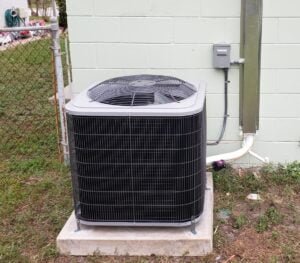
Experience the Difference with the AC Therapist: Your HVAC Solution Provider
The AC Therapist is a professional HVAC service provider that specializes in repairing and installing air conditioning systems in Hillsborough, Pinellas, and Pasco County. Their team of experts has years of experience and can provide reliable, efficient, and affordable services to customers in need.
If you are facing a malfunctioning AC or looking to upgrade to a more energy-efficient system, the AC Therapist can help. They offer a wide range of services, including AC repair, installation, and maintenance, as well as advice on the best course of action for your specific needs and budget.
The AC Therapist prides itself on its commitment to customer satisfaction, quality workmanship, and competitive pricing. They understand the importance of a well-functioning air conditioning system, especially in hot and humid climates, and strive to provide their customers with fast, reliable, and effective solutions.
So, if you’re in need of AC repair or installation services, look no further than the AC Therapist. Contact them today to schedule an appointment and experience the difference their expert services can make in your home or office.

